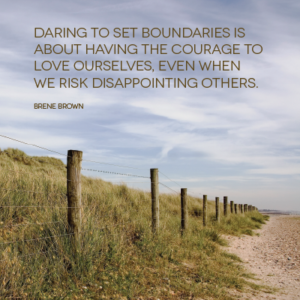Setting boundaries with people is sometimes one of the most difficult, but also one of the healthiest, things we can do. Some people are better at doing this than others. After recent conversations I have had about this, I think it’s an important enough issue to which we should devote some time.
For the sake of example, let’s use the case of “Jane”.
 “Jane” describes herself as “happy-go-lucky.” She’s very compassionate, warm, and friendly. Unfortunately, she has difficulty setting boundaries with people in her life that she says are ‘toxic’. “Jane” says these ‘toxic’ people drain her of her energy and do nothing but complain and bring her down when she’s feeling good. She is afraid of standing up to them not only for fear of hurting their feelings or making them angry, but also because of the possibility of losing them as friends. “Jane” doesn’t want these people completely out of her life – she just wants them to stop being so negative and stop asking so much of her.
“Jane” describes herself as “happy-go-lucky.” She’s very compassionate, warm, and friendly. Unfortunately, she has difficulty setting boundaries with people in her life that she says are ‘toxic’. “Jane” says these ‘toxic’ people drain her of her energy and do nothing but complain and bring her down when she’s feeling good. She is afraid of standing up to them not only for fear of hurting their feelings or making them angry, but also because of the possibility of losing them as friends. “Jane” doesn’t want these people completely out of her life – she just wants them to stop being so negative and stop asking so much of her.
Can you identify with “Jane”? Fearing making people angry and losing them as friends are common fears when it comes to boundary setting. The important thing to remember though is that if the other person does get angry or tries to make you feel guilty or bad about setting boundaries with them, they have a problem, not you. This is assuming you were polite and gentle in your request. For example, if you have a friend who is always coming to you with his or her problems, is always negative, and never wants to do anything to change, eventually, you will probably get tired of hearing from that person. There is a difference between being a good friend and allowing yourself to be taken advantage of. We all only have so much time and energy to give to the areas of our life — to God, our family, our job, our other responsibilities, and our friends. If that friend is calling you on the phone constantly and complaining about a job situation or marital problems or anything else, that’s less time and energy you are able to devote to those other important aspects of your life.
Let’s take the example of a friend calling you all the time and spending the majority of the time talking negatively about other people and complaining about life’s problems. The main reason you should want to take action is because of the effect the relationship is having on you. After talking with your friend, you feel tired and “talked out.” You have nothing left to give your spouse and kids. Maybe you’re so tired you don’t even feel like praying. All you feel like doing is zoning out in front of the TV. You can see how a relationship like this is toxic. By confronting this issue head-on, you are not only doing good for yourself and your family, you may actually do your friend more good than you realize. There’s a good book on the subject called Boundaries by Dr. Henry Cloud and Dr. John Townsend. I like one part in particular that states, “maintaining your boundaries is good for other people; it will help them learn what their families of origin did not teach them: to respect other people.”
 So what might boundary setting in this situation look like? When we set boundaries, or have any unpleasant conversation with another, many of us tend to beat around the bush, myself included. Being direct is certainly the best way to go here, but also prefacing it by saying something positive, but true. If you really value your friendship with this person, you might start out by saying that. “Look, Tom, I really value your friendship, and I think it’s great that you’re willing to confide in me about the things going on in your life, but right now I really need to focus more on my wife and kids (or whatever else). I need to spend time with them in the evenings, but I’d love it if we could get together on the weekend or plan a set time to meet up for lunch during the week.”
So what might boundary setting in this situation look like? When we set boundaries, or have any unpleasant conversation with another, many of us tend to beat around the bush, myself included. Being direct is certainly the best way to go here, but also prefacing it by saying something positive, but true. If you really value your friendship with this person, you might start out by saying that. “Look, Tom, I really value your friendship, and I think it’s great that you’re willing to confide in me about the things going on in your life, but right now I really need to focus more on my wife and kids (or whatever else). I need to spend time with them in the evenings, but I’d love it if we could get together on the weekend or plan a set time to meet up for lunch during the week.”
 Conveying that you really do value the friendship and you still want to spend time together should soften the blow. If your friend crosses the boundary, you’ll need to address that in the same manner. If you don’t enforce the boundaries you set, they’re meaningless. I would encourage you to think about the relationships you have and if there are any that are doing you more harm than good. If there are relationships that need to have boundaries set, pray to God to give you the strength to do it and for wisdom and understanding for the person you’re setting the boundary with.
Conveying that you really do value the friendship and you still want to spend time together should soften the blow. If your friend crosses the boundary, you’ll need to address that in the same manner. If you don’t enforce the boundaries you set, they’re meaningless. I would encourage you to think about the relationships you have and if there are any that are doing you more harm than good. If there are relationships that need to have boundaries set, pray to God to give you the strength to do it and for wisdom and understanding for the person you’re setting the boundary with.
In His Service,
Jarvis
If you need additional help with setting healthy boundaries in your relationships, or if you are looking to point a friend in the direction of help, contact Jarvis for more information at 217-423-6955.













0 Comments